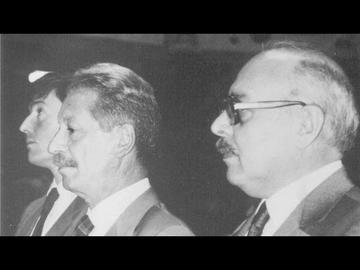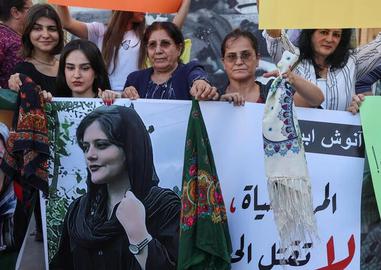The murder of Mahsa Amini by Iran’s morality police last month in Tehran sparked an unprecedented movement which is leading to the downfall of the corrupt and criminal regime of the ayatollahs.
The brutal response of the security forces to the demonstrations, now in their fourth week, and causing many deaths, injuries and detentions, has nevertheless not weakened the resolve of the so-far leaderless and ordinary people in the streets. Iranians are continuing with their “revolution” and with their demands that the mullahs leave power.
The regime, weakened by its continual use of force for repression, is unable to respond meaningfully to the demands of the demonstrators. It is doomed to fall. It may take a month, maybe more, or even a year. But sooner or later it will fall.
The question for the Iranian people is this: how to transition from the Islamic Republic to a democratic state that respects its citizens and does not murder or brutalize them for a simple disregard of the rules.
For the time being, being leaderless is a strength of this movement. Totalitarian regimes like the Islamic Republic are good at destroying, detaining and murdering the leaders of any movement that may oppose them. But as time goes by, and as the movement becomes more radical, being leaderless may become a liability. It may allow opportunists and those who can shout louder, or are better organized, to hijack the movement. And it may inhibit the populace from making sound decisions. Those with special interests or agendas would be able to undermine such decisions that do not fit their own aims.
In 1978, Iran faced the same dilemma. Civil and liberal movements in the earlier part of the 1970s exploded into mass demonstrations and general strikes that crippled the regime of the Shah. By November 1978, after 10 months of non-stop anti-Shah demonstration, Mohammad Reza Pahlavi said: “I have heard the voice of your revolution”. And with that sentence, he accepted the collapse of his rule.
It was clear that his absolute rule could not continue. The Shah extended a hand to the opposition, mainly the National Front, to save the country from collapse and from Islamic rule. But the National Front refused to cooperate. Dr. Gholam Hossein Sadighi, one of the most prominent members of the secular opposition, refused to accept the post of prime minister. In desperation, the Shah offered the post to less and less prominent members. All refused – until Shahpour Bakhtiar accepted the role in December 1978. He was immediately branded a traitor to the National Front movement. None of his colleagues there or in other secular movements endorsed him. Instead, they all supported Ayatollah Ruhollah Khomeini and his vision of an Islamic Republic. They were prepared to accept the lies of Khomeini in preference to the words of someone who had fought all his life for freedom and democracy.
It is true that the Shah left it too late, and the expectations of the people had moved on. They were not prepared to accept Bakhtiar’s promise of free elections and democracy. The opportunity to bring a total end to the Shah’s regime – and that of his lackeys – was considered more important than considering who would be their next ruler and the nature of his government.
No one was prepared to listen to the warnings of a young lawyer – I was just 31 at the time – and the few friends I had gathered. Talking about a deal or a compromise was extremely unpopular. Even Dr. Haj Seyed Javadi, one of the most prominent members of the opposition to the Shah, insisted, in a meeting that I chaired for young Jewish activists, that “the contents of the next constitution are minor technicalities – let us focus on bringing a total end to the corrupt regime of the Pahlavi dynasty”.
As Bakhtiar had promised, the Shah left Iran on January 16, 1979. The movement had succeeded. The Shah was out and a leader of the opposition to the Shah was prime minister.
But that was not enough. Those who had the loudest voice, Islamists supported by the Mujahedeen and the Fedayeen, had their own agenda. They pushed the otherwise leaderless population to reject Bakhtiar and to welcome Khomeini. It was an existential mistake that condemned two generations of Iranians to the criminal rule of the mullahs, leaving a country pillaged, destroyed and ruled by violence and lawlessness.
Sooner or later, the same stark choice will again face the people of Iran. The time will come when the mullahs realize time is up. And that is when they will extend a hand to the opposition to hand over the government. Do we accept the hand, or, as in 1978 and 1979, do we reject it and go for the kill? Do we want to see a brutal end to this regime and put its supporters one by one to the gallows? Do we rate vengeance and destruction of the Islamic Republic higher than what the nature of the next regime might be?
I hope not.
Hamid Sabi is a prominent Iranian-British human rights lawyer based in London.
visit the accountability section
In this section of Iran Wire, you can contact the officials and launch your campaign for various problems

























comments